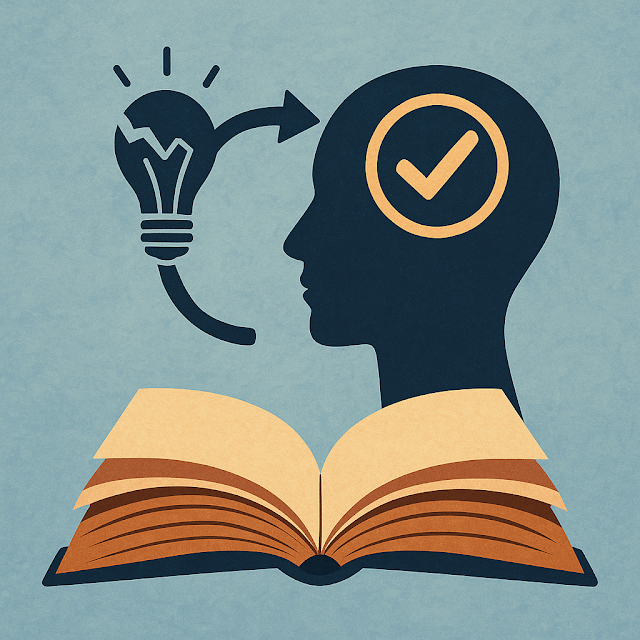42. The Impact of Discontinuation of Learning on Psychological Achievement: When Interrupted Effort Rewrites Motivation
42. LearningPsychology - The Impact of
Discontinuation of Learning on Psychological Achievement: When Interrupted
Effort Rewrites Motivation
Every learner begins a new journey with
hope—whether it’s a college course, a language program, or a personal skill
challenge. But not every journey is completed. When learning is interrupted,
something more than progress halts—psychological momentum, identity, and
confidence take a hit.
Discontinuation of learning doesn’t simply
delay knowledge acquisition. It creates a rupture in the learner’s
self-perception, disrupting the sense of accomplishment, autonomy, and
self-efficacy. The impact may be subtle or profound, depending on how the
interruption is experienced, interpreted, and integrated into one’s story.
In this post, we’ll explore how stopping a
learning journey can affect psychological achievement, what mechanisms are
involved, and how learners can rebuild after interruption.
1. What Is Discontinuation of Learning?
A. Basic Definition
Learning discontinuation refers to the premature end or abandonment of a
learning process, whether voluntary or forced. This includes leaving formal
education, quitting a self-study plan, or stalling in a skill progression.
B. Common Causes
• Burnout or overload
• External life stressors (e.g., illness, financial issues)
• Lack of perceived progress or support
• Emotional fatigue or perfectionism
C. Discontinuation vs. Pausing
Pausing can be temporary and restorative, while discontinuation often carries emotional
weight—like guilt, frustration, or loss of identity.
2. The Psychological Cost of Interrupted
Learning
A. Erosion of Self-Efficacy
When learning ends unexpectedly, it can undermine a learner’s belief in
their ability to complete tasks or face new challenges.
B. Fragmented Sense of Achievement
Learners may feel their efforts were wasted or meaningless, reducing their
motivation to re-engage in future learning.
C. Loss of Identity Momentum
Learning often forms part of one’s personal narrative (“I’m the kind of person
who’s growing”). Disruption creates psychological dissonance, weakening
the learning identity.
3. Emotional Responses to Learning
Discontinuation
A. Guilt and Shame
Particularly in high-achieving individuals, stopping a course or habit may
generate harsh self-judgment, especially if expectations were high.
B. Anxiety and Doubt
Learners may begin to question their capacity, intelligence, or consistency,
reinforcing self-limiting beliefs.
C. Relief and Reframing
In some cases, discontinuation brings relief and the chance to realign goals
or priorities. The key difference is whether the learner feels in control
of the choice.
4. Psychological Mechanisms at Play
A. The Zeigarnik Effect
This phenomenon suggests that unfinished tasks linger in the mind, often
with more psychological weight than completed ones. This can amplify tension
around learning gaps.
B. Attribution Theory
How learners interpret failure—whether as a lack of effort, ability, or
external conditions—shapes future motivation and confidence.
C. Identity Theory
Our sense of self is constructed partly through consistent behaviors.
Interrupting learning disrupts that consistency and can create identity
diffusion.
5. Discontinuation in the Context of
Lifelong Learning
A. Not All Learning Is Linear
People often stop and start learning due to life phases. Understanding that learning
has seasons helps normalize discontinuation.
B. Psychological Recovery and Re-entry
When a break becomes a source of regret, structured re-entry strategies
(micro-goals, reframing, support networks) can help rebuild confidence.
C. The Role of Self-Compassion
Learners who treat themselves with compassion after a setback are more
likely to return and succeed, compared to those stuck in self-criticism.
6. Strategies for Recovery After
Learning Discontinuation
A. Normalize the Break
Acknowledge that stopping doesn’t equal failure. Viewing the pause as a
cycle, not an endpoint, helps reframe the experience.
B. Set Restart Conditions
Instead of jumping in blindly, set small entry points like “one module a week”
or “15-minute reviews.” Momentum is built, not waited for.
C. Reconnect With Purpose
Remind yourself why you began. Was it growth, career, curiosity? Intrinsic
motives are more sustainable than guilt-driven goals.
7. Real-Life Examples of Learning
Interruption and Renewal
A. The Career Changer
After dropping out of a coding bootcamp, Jordan spent months doubting himself—until
he restarted with a slower, self-paced course, eventually landing a
junior dev job.
B. The Overwhelmed Parent
Maria, juggling childcare and part-time study, left her program mid-semester. A
year later, with better support systems, she returned—with more resilience
and boundaries.
C. The Burnt-Out Student
Liam paused his graduate thesis after losing interest. What seemed like an exit
turned into a recalibrated return, where he rewrote his topic and
finished stronger.
Example: Psychological achievement often
doesn’t come from unbroken progress—but from falling, reflecting, and
resuming.
8. Educational Implications: Designing
for Continuity and Return
A. Modular Learning Design
Courses should be flexible, allowing exit and reentry without penalty.
Chunked content and adaptive timelines help learners maintain engagement.
B. Emotional Checkpoints
Frequent reflection prompts can help learners identify burnout early and
plan pauses rather than crash.
C. Institutional Empathy
Programs that offer reactivation options, counseling, and peer support see
higher return rates and student satisfaction.
FAQ
Q1. Does discontinuing learning mean I’ve
failed?
Not at all. Learning is a long-term endeavor. What matters is not when you
stop—but whether you find a way back when it matters to you.
Q2. How can I avoid repeating the same
interruption pattern?
Reflect on what led to the pause. Was it overwhelm? Lack of relevance? Adjusting
pace, structure, or goals makes recurrence less likely.
Q3. Is it better to push through or take
breaks?
Pushing through can sometimes deepen burnout. Planned, purposeful breaks are
far more effective than forced ones.
Interruption is not the enemy—stagnation
without reflection is
Learning discontinuation carries real
emotional and psychological weight. But it also offers a mirror to your
motivations, habits, and values.
The most successful learners don’t avoid interruption—they build the wisdom to restart
when it counts, with greater clarity and care.

Comments
Post a Comment